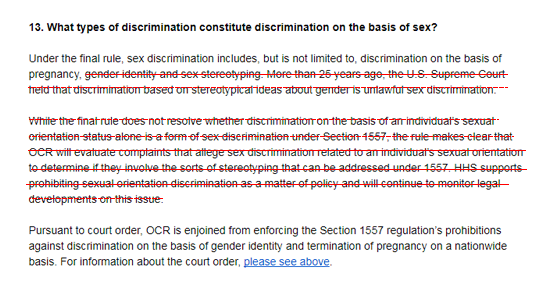Abortion rights, women of color, and LGBTQIA+ people are under attack. Pledge to join us in fighting for gender justice.
JUST LET KIDS PLAY!

It’s a scary time to grow up in the United States as a trans, nonbinary, or intersex person. Trans people, especially our youth, have never been this visible (read: vulnerable). I’ve heard from many friends lately that reading the news is upsetting and overwhelming—which probably holds true for many cisgender people who love us trans people, and who care about our safety, futures, and happiness.
Among the relentless barrage of headlines, you may have missed the news from a few weeks ago—when the U.S. Department of Education released a new draft rule about Title IX* that has the power to define when and how trans, nonbinary, and intersex students play school sports. (*Title IX is the federal law banning sex discrimination in education, anywhere federal dollars are used. If you’ve played on a U.S. girl’s or women’s school sports team, you probably have Title IX to thank for that chance!)
There’s a lot to discuss here, but first it’s important to acknowledge this draft rule has already caused serious stress and confusion for the trans, nonbinary, and intersex community. The actual rule is one short paragraph, but it’s accompanied by 114 long pages of “preamble”—these 114 pages could be improved to add clarity, because right now even some experts have differing predictions about how this rule will play out in the future.
The fear and anger in our community is completely valid, especially in a context where our opponents have ramped up efforts to bully and criminalize trans people in a coordinated, national strategy to ban our existence and, ultimately, enforce conformity with sex stereotypes that harm everyone. While the vast majority of people in the U.S. actually want strong civil rights laws protecting LGBTQI+ people, a handful of well-funded extremists have drowned out this support and monopolized the conversation on trans and nonbinary rights. (Spoiler alert, it’s no accident anti-trans extremists overlap with villains from the anti-abortion movement and full-on white supremacists and misogynists – they’re all creepily trying to control other people’s bodies!) In this moment, the LGBTQI+ community is concerned that some political leaders who promised us their support have become enmeshed by fear, failing to follow through and eroding long-term trust. That’s unacceptable. NWLC recognizes that “compromising” with anti-trans extremists threatens the lives and health of many girls and women, especially trans women, gender nonconforming women, and intersex women.
With that in mind, let’s dig into the pending Title IX athletics rule, which clarifies the high level of review schools must pass through if seeking to limit trans, nonbinary or intersex students’ ability to play sex-separated school sports. Just like NWLC has been saying for years, this rule affirms that anti-trans sports bans are, and have always been, illegal. It’s fantastic to see action by the federal government that would spell death to the 21 state categorical sports bans that exclude all transgender, nonbinary, and intersex students from playing! This is a huge step towards protecting the rights of transgender, nonbinary, and intersex students under Title IX to play alongside their peers.
That said, the overall framework of the preamble has caused significant confusion, and we are concerned bad actors will try to assert interpretations that let them exclude trans, nonbinary, and intersex students from playing with their peers. We’ve drafted recommendations to the Department of Education for how the Title IX athletics preamble should be written, so there’s no room for doubt on this rule’s strong mandate of inclusion. The rule can be improved to ensure it’s not weaponized by those seeking to reinforce dangerous myths about trans bodies that harm all women and girls in sports—especially Black and brown women due to links between racist and sexist stereotypes. We will recommend that the Department strengthen the rule by making some key clarifications (list below.)
If you’re a student, parent, or anyone who wants to voice their support for the rights of transgender, nonbinary, and intersex students, you can submit a comment to the Department of Education on its new rule today! We have written a template comment you can submit in 1 minute, or take 5 minutes to adapt it with your own words.
The important thing is we all need to tell the government to finalize a strong, inclusive athletics rule that begins with the assumption that all LGBTQI+ students belong in school sports. A rule that protects against schools trying to impose discriminatory restrictions that are based in harmful, overbroad gender stereotypes.
If you want to learn more about the rule to customize your own comment, check out our factsheet. Finally, to spread awareness on how a strong, inclusive athletics rule helps all students, share this social media toolkit on the rule to tell your community why it’s important to protect LGBTQI+ students—including Black and brown women and girls—from body policing and bullying in school.
Voicing support for transgender, nonbinary, and intersex students is an important opportunity for students, parents, and those who care about students to take back the narrative that self-serving politicians have peddled to further their own extremist agendas, demonizing LGBTQI+ youth just to score political points with their conservative base. (Make no mistake, if you’re furious and upset about attacks on trans kids you’ve got good company—as of April 2023, 86% of people think anti-trans attacks are a problem!)
These kids cannot wait any longer for the federal government to fulfill its promise to protect them from hostile politicians attempting to use them as pawns in a political game—because LGBTQI+ youth are people, not your bogeyman. Our community is more than strong enough to end the bullying and stop the coordinated national strategy to ban trans people out of existence.
So once and for all, let’s tell the Department of Education that our kids need a strong athletics rule, with no echoing the hate groups seeking to vilify our trans, nonbinary, and intersex youth. TAKE ACTION HERE TODAY.
The Title IX Athletics Rule—How to Get it Right:
-
Trans, nonbinary, and intersex students really need to hear that the Department of Education has their back
-
- The athletics rule needs to show that the federal government supports the LGBTQI+ community, including in rebutting dangerous anti-trans myths. The Department should say it is not the view of the federal government that trans student athletes have any categorical advantage in sports, or that permitting them to play will create a risk of injury—or deny opportunities—to cisgender students. The final Title IX rule should affirm that it is illegal for schools to exclude trans, nonbinary, or intersex students from sports based on these fearmongering and lies.
-
Genital examinations and other kinds of sex testing have no place in school
-
- The Department must make it plain that harmful sex verification procedures are never permissible under Title IX. These pseudoscientific and extremely harmful practices range from physical examinations of students (including genital exams) to surgical requirements that create pressure for student athletes to submit to certain medical interventions in order to “prove” their gender.
- Sex testing stigmatizes students and creates new avenues for sexual abuse of students—which harms trans, nonbinary, and intersex students, and also disproportionately harms Black and brown women and girls, who have long suffered body policing in sports because of racist and sexist stereotypes that label women of color as inherently “more masculine” and less feminine.
-
In school sports, just participating improves a student’s education. That’s why everyone needs opportunity to play!
-
- If NWLC were writing the athletics rule, we’d just say that: everyone gets to play. Discriminating against trans kids is sex discrimination, full stop.
- Recognizing that the Department of Education may stick with the standard they put forward in this draft rule, we think it should explain that this standard means:
- All students at the K-12 and college club and intramural level are able to play sports, free from sex discrimination based on trans or intersex status—because the main education benefit of these sports flows from participation in terms of improved grades, social skills like teamwork, and mental and physical health benefits.
- Students never have to prove they deserve to participate, including in the context of competitive intercollegiate sports. Schools always bear the stringent burden of defending any rule they adopt that limits a student’s ability to play based on trans status or intersex status. If a university could rebut the presumption of inclusion for a specific sport, at the competitive intercollegiate level, they would still need to write a policy that doesn’t reinforce sex stereotypes and that minimizes harm to any students excluded.




